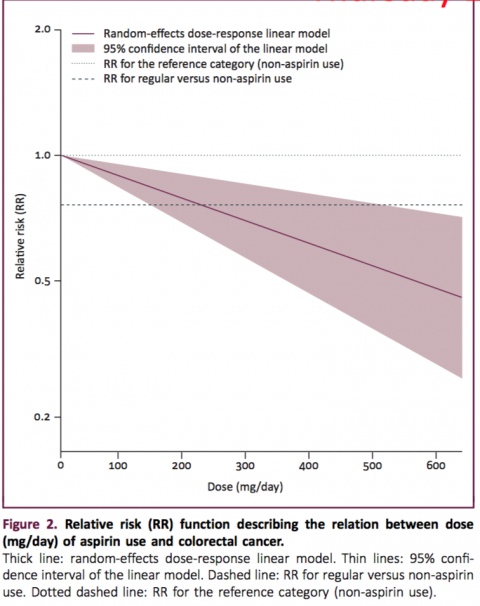News • Digestive tract
Aspirin linked to reduction in risk of several cancers
Aspirin is associated with a reduction in the risk of developing several cancers of the digestive tract, including some that are almost invariably fatal, such as pancreatic and liver cancers. The largest and most comprehensive analysis to date of the link between aspirin and digestive tract cancers found reductions in the risk of these cancers of between 22% and 38%.

© Jens Goetzke / pixelio.de
Aspirin has been linked to a reduction in the risk of bowel cancer for some time, and other, smaller analyses have found associations with cancers of the oesophagus (the food pipe or gullet) and stomach. This analysis looked at evidence from 113 observational studies investigating cancers in the general population published up to 2019, of which 45 studies were on bowel cancer and included 156,000 cases. In addition to bowel cancer, the cancers investigated included those of the head and neck, oesophagus, stomach, the part of the stomach that connects to the oesophagus (gastric cardia), liver, gallbladder and bile ducts (hepato-biliary) and pancreas.
The researchers, led by Dr Cristina Bosetti (PhD), head of the Unit of Cancer Epidemiology at the Mario Negri Department of Oncology, Milan (Italy), found that regular use of aspirin, defined as taking at least one or two tablets a week, was associated with a significant reduction in the risk of developing all these cancers, apart from head and neck cancer.
Further studies required

Specifically, aspirin use was linked to 27% reduced risk of bowel cancer (45 studies), 33% reduced risk of oesophageal cancer (13 studies), 39% reduced risk of gastric cardia (ten studies), 36% reduced risk of stomach cancer (14 studies), 38% reduced risk of hepato-biliary cancers (five studies), and 22% reduced risk of pancreatic cancer (15 studies). Ten studies of head and neck cancer did not show a significant reduction in risk.
The senior author of the paper, Carlo La Vecchia (MD), Professor of Epidemiology at the School of Medicine, University of Milan, said: “There are about 175,000 deaths from bowel cancer predicted for 2020 in the EU, of which about 100,000 will be in people aged between 50 and 74. If we assume that regular use of aspirin increases from 25% to 50% in this age group, this would mean that between 5,000 to 7,000 deaths from bowel cancer and between 12,000 and 18,000 new cases could be avoided if further studies show that aspirin does indeed cause the reduction in cancer risk.
“Corresponding figures would be approximately 3,000 deaths each for oesophageal, stomach and pancreatic cancer, and 2,000 deaths from cancer of the liver. Given the unfavourable prognoses for these cancers, the number of new cases would be only slightly greater.”
Risk of cancer: Reduction with increased dose
Our findings on bowel cancer support the concept that higher aspirin doses are associated with a larger reduction in risk of the disease.
Cristina Bosetti
The researchers also analysed the effect of aspirin dose and duration on bowel cancer. They looked at low dose (100mg), regular (325mg) and high dose (500mg), combined with how many times a day, week or month it was taken.
Dr Bosetti said: “We found that the risk of cancer was reduced with increased dose; an aspirin dose between 75 and 100mg a day was associated with a 10% reduction in a person’s risk of developing cancer compared to people not taking aspirin; a dose of 325mg a day was associated with a 35% reduction, and a dose of 500mg a day was associated with a 50% reduction in risk. However, the estimate for high dose aspirin was based on just a few studies and should be interpreted cautiously.
“Our findings on bowel cancer support the concept that higher aspirin doses are associated with a larger reduction in risk of the disease. However, the choice of dose should also take into consideration the potential risk of stomach bleeds, which increases with higher aspirin doses.
“Compared to people who did not take aspirin regularly, the risk of bowel cancer declined in regular aspirin users up to ten years. The risk was reduced by 4% after one year, 11% after three years, 19% after five years and 29% after ten years.”
Prof Carlo La Vecchia said: “These findings suggest there’s a beneficial effect of aspirin in the prevention of bowel and other cancers of the digestive tract. The results for bowel, oesophageal and pancreatic cancers are consistent with evidence from clinical trials on aspirin in the prevention of heart and blood vessel diseases.
“The findings for pancreatic and other digestive tract cancers may have implications for the prevention of these highly lethal diseases. For pancreatic cancer, we found that risk of the disease declined by 25% after five years among people who took aspirin regularly compared to those who did not.
Recommended article

News • Major success
Colorectal cancer deaths go down 7% - but it's too early to celebrate yet
The decline in cancer of the intestines – colorectal cancer – is one of the major success stories of the past 30 years in Europe say researchers, as they predict that in 2018 death rates from the disease will continue to fall by around seven per cent compared to 2012. In a study published in the leading cancer journal Annals of Oncology, researchers predict that death rates in the European…
High risk = greatest benefit
“Taking aspirin for the prevention of bowel cancer, or any other cancers, should only be done in consultation with a doctor, who can take account of the person’s individual risk. This includes factors such as sex, age, a family history of a first-degree relative with the disease, and other risk factors. People who are at high risk of the disease are most likely to gain the greatest benefits from aspirin.”
In addition to stomach bleeds, the side effects of aspirin include bleeding in other parts of the body and, occasionally, haemorrhages.
As the study is based on observational studies, it can only show that aspirin is associated with a reduced risk, and biases or confounding factors may partly explain its results. Other limitations include the fact that in some studies information may not reflect changes in aspirin use over time; the people in the studies might not remember or report their aspirin use accurately; and most studies did not have data on other medications that might affect the association between aspirin and the risk of cancer.
Notes:
[1] “Aspirin and the risk of colorectal and other digestive tract cancers: an updated meta-analysis up to 2019”, by C. Bosetti et al. Annals of Oncology. https://doi.org/10.1016/j.annonc.2020.02.012
Source: Annals of Oncology
16.04.2020





